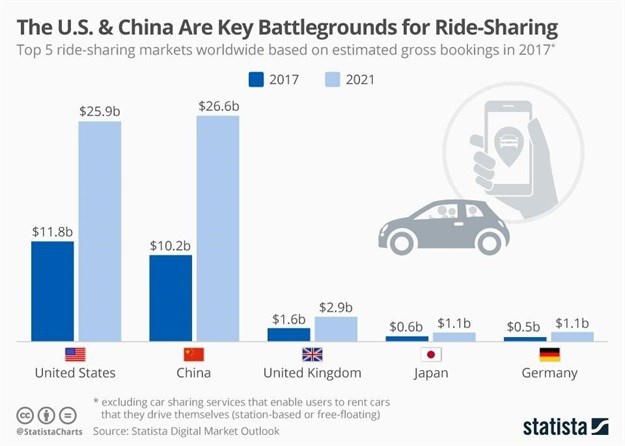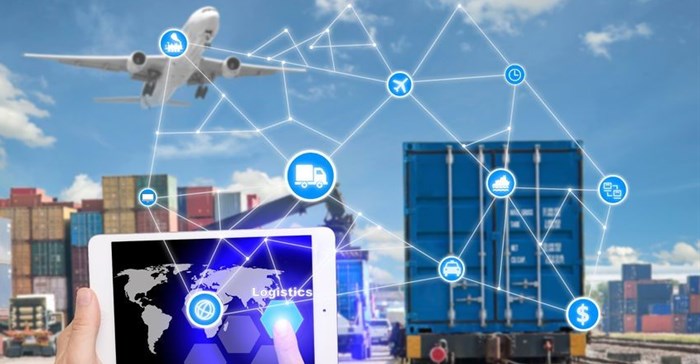With the increase in the number of application users and in order to stand out from competitors in the market, the need for enterprise mobile app development has become an absolute must-have.
Mobile technology has facilitated various aspects of our lives and transportation is no exception.
Today, staying in metro cities, the two biggest challenges people face are heavy traffic and a shortage of parking space. This is one of the reasons why many people no longer prefer buying a car but rather rely more on app-based ride-hailing services like Uber.
According to Annual Carplus UK Survey the use of private cars reduced by 10% while there was an increase of 7% in the use of public transport and ride-hailing services.

Source: Statista
According to Statista’s Digital Market Outlook, ride-sharing services in the US market will amount to nearly $12bn this year and are expected to increase to $26bn by 2021. While the gross booking in China is expected to amount to nearly $10bn this year.
Let’s take a look at the benefits of mobile app technologies to empower businesses in the transportation industry:
Artificial intelligence: The transportation ecosystem has been power-driven by artificial intelligence. Smarter cars, self-driving technology, on-demand transportation, and transportation planning are some of the examples of where artificial intelligence has had an influence. By making use of the observed data, artificial intelligence can predict or make pertinent decisions.
Being used in traffic management operations, it has facilitated more diverse transportation usage and reduces the risk of traffic accidents.
Autonomous vehicles: Self-driven cars and trucks have been an upcoming trend. In October 2016, Uber Advanced Technologies group announced a driverless truck that drove 120 miles at 55 mph.
The internet of things: The dawn of mobile technologies and IoT enterprises let transportation and logistics accelerate their productivity, increase profits, and synchronise their operations.
IoT-enabled mobile devices are created in a way that they can track inventory data, vehicle performance, as well as equipment. This gives enterprises a digital influence over their physical belongings.

A viable IoT solution can let enterprises connect all devices across a consolidated cloud computing network where critical data can be stored and shared, thereby letting enterprises gain an accurate and actual time perception of their operations. With IoT, companies can track their fleet, take proactive measures in terms of fleet management, and avoid unnecessary expenses.
Big data analytics: Big data is used in every aspect of the transportation industry for different purposes. It helps individuals, and governments on different levels to make effective decisions in terms of exploring new routes or controlling traffic.
Railways use big data in various ways. For example, once a train leaves the station, big data is generated with the help of data sources like a mobile GPS unit to record speed, the distance between trains and also weather conditions in order to ensure commuters’ safety. With the help of this information, railway authorities can make quick decisions and ensure a safe railway journey for travellers.
Blockchain: Blockchain technology in trucking ensures the history records of performance with accuracy. When a second-hand truck is sold, for example, the customer could have questions related to how the vehicle was used. With blockchain technology, all transactions are transparent and all parties who are involved in the transaction can rest assured that the information about the truck is reliable.
Based on the cargo volume, the cost of transportation is decided. By using IoT radars, one can obtain information on the amount of space a specific cargo occupies. Based on this information, one can calculate the shipment cost. With the use of this technology, the transport industry can store information into a blockchain-based system and can reap the benefits of status updates, improved cargo security, and faster freight payments.
E-commerce industry: Mobile apps have changed the consumer-retailer relationship. Businesses can reach the consumer everywhere by having a mere presence of the brand's app on a consumer’s phone.
Drone delivery: Drone deliveries have been an upcoming trend in the transportation industry. In 2016, Amazon introduced a new programme named Prime Air in England where it successfully delivered the order to its customer within 30 minutes by using a drone.
The transportation industry incurs huge expenses on auto parts, fuel, vehicle insurance, maintenance, and more. Investing in equipping a fleet with smart mobile devices and adopting modern mobile technologies is the key to accelerate the operation of the transportation industry and garner the benefits.
